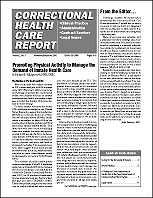Legal Developments
Author: Margaret R. Moreland, J.D., M.S.L.S..
Source: Volume 03, Number 05, July/August 2002 , pp.73-75(3)

< previous article |next article > |return to table of contents
Abstract:
Do Individuals Lose Their Right to Medical Privacy When Incarcerated? John Doe, an inmate at the State Correctional Institution in Pittsburgh, was tested and found to be HIV-positive. He signed a written consent for disclosure form because the medical staff told him that his HIV status would be kept confidential. The plaintiff in Raquyb v. Eagen, 17 N.Y.S.2d 814 (3d Dept. 2000), objected to disclosure of confidential medical data in a decision written by the Central Office Review Committee. He was an inmate and had filed a grievance because of his transfer from one facility to another where, he alleged, he could not get adequate treatment for his medical condition. The Disclosure of Information Can Harm Prison Staff, as Well as Inmates. Robert Guy was a county inmate who was being transferred by corrections officers and nurses to a psychiatric area for observation, after exhibiting bizarre and resistant behavior.Keywords: Walen v. Roe, United States v. Westinghouse Electric Corp, Wolff v. McDonnell, Pell v. Procunier, Powell v. Schriver
Affiliations:
1: Pace University School of Law Library.